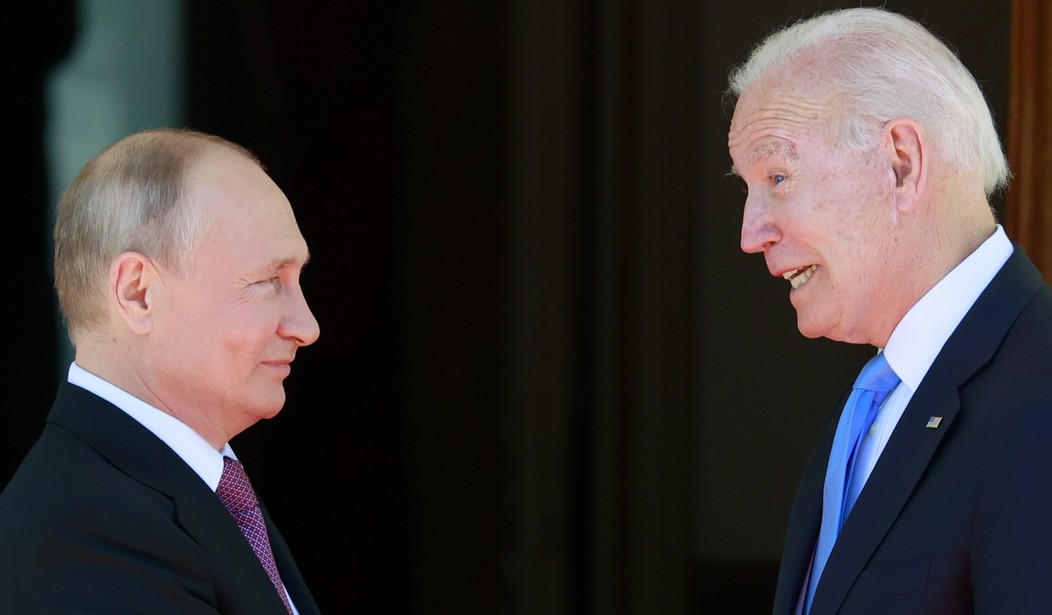But will a “minor incursion” result in a “minor sanction”? The White House continued stepping up tough talk in the Ukraine crisis to compensate for Joe Biden’s stunning fumble in last week’s presser, in which he insinuated that the US had more or less resigned itself to Russian action. While ordering a diplomatic evacuation from Kyiv, Biden made Vladimir Putin a personal target of potential sanctions:
With diplomatic talks seemingly stalled and the war of words between Washington and Moscow intensifying, President Biden says the United States would be willing to impose personal sanctions against President Vladimir V. Putin of Russia if he directed Russian forces to invade Ukraine.
The threat to target the leader of a world power directly reflected both the Biden administration’s intent to deter Russian aggression by conveying the high costs it would incur, as well as a recognition that Mr. Putin would most likely be the one who decides whether to invade. …
For weeks, the Biden administration has warned Russia that it would impose punishing economic sanctions if it invaded Ukraine. Asked on Tuesday whether those penalties could directly target Mr. Putin, Mr. Biden told reporters at the White House, “Yes, I would see that.”
Russia didn’t seem particularly worried about the threat:
Mr. Putin’s spokesman, Dmitri S. Peskov, said that threats of direct sanctions against the Russian leadership would not have any serious effect financially or change its course of action.
“It wouldn’t be painful politically — it would be destructive,” Mr. Peskov said on Wednesday.
I doubt that the Kremlin is worried about Putin’s personal finances. Putin has had more than two decades to harden his wealth against Western attempts to make him financially vulnerable. Going after Putin personally doesn’t actually address the Ukraine issue either, since Russian interests in Ukraine run far deeper than Putin’s pockets. Personal sanctions on Putin isn’t entirely a non-sequitur, but it’s not far from one either.
If Biden and the EU wanted to use economics to deter Russian aggression on its borders, they would focus on driving energy costs down and making Russian exports less attractive. The EU is never going to return to coal, but they could restart their nuclear-power industry to provide carbon-free electricity to replace Gazprom imports. France never stopped using nuclear power and has been almost alone in resisting demands to curtail or shut down those plants.
The US has even more resources to leverage in this area. Biden has been under the thumb of environmentalists and climate-change hysterics who want to stop US exploration, extraction, and exports of oil and natural gas. Biden’s first EOs as president took steps in that direction, which raised prices globally on oil — a move that put significantly more money into Russia’s pockets and is at least in part fueling their recent aggression, literally and figuratively. A recommitment to the aggressive exploration and extraction policies of the Trump administration would drive those prices down in a hurry, and with it much of the vitality of Russia’s economy. Struggling economies cannot back up military aggression for long.
Otherwise, we have to find ways to make sanctions sting while our policy boosts Russia’s petro-based economy. Again, targeting Putin is an act of impotency, but broader sanctions on the oligarchs supporting Putin could have an effect. However, Putin likely has already gamed out that risk and offered financial protection to his industrial clique. Even if he hasn’t, such sanctions will take a long time to have any significant political effect, by which time a Russian invasion — if it comes — will have long since been a fait accompli.
How do we know this? It’s exactly what happened in 2014 during the Barack Obama-Joe Biden administration when Russia seized Crimea and its proxies took control of the Donbas. When American oil exports drove prices down in the Trump years, Putin and Russia got significantly less aggressive. In the past year, we’ve put cash in Putin’s pockets by signaling our eventual decline in energy exports and future reliance on imports again.
Cutting the price of oil is the only sanction that actually works, and now we’ll see which is more important to Biden: restraining Russia or restraining the American energy industry. That’s less of a question than a fait accompli of its own, really.








Join the conversation as a VIP Member